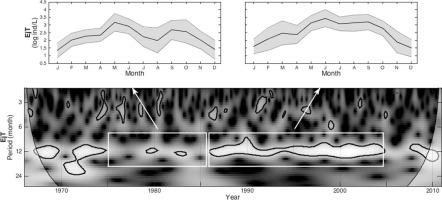Journal of Great Lakes Research ( IF 2.2 ) Pub Date : 2022-06-25 , DOI: 10.1016/j.jglr.2022.06.001 Gaël Dur , Xin Liu , Yoichiro Sakai , Chih-hao Hsieh , Syuhei Ban , Sami Souissi

|
The seasonal cycle is an important feature of life, leading to the succession of different species and allowing them to share a common environment. Disruption in the seasonal cycle of many species has been reported, but the source of disruption varies from species to species. Lacustrine zooplankton species are widely acknowledged to respond to climate-induced, thermal and trophic variations. Here, we discuss the case of a warm-adapted copepod in Lake Biwa (i.e., Eodiaptomus japonicus), which experienced changes in trophic status and thermal regime over four decades (1966–2010). We investigated the phenological response of E. japonicus to these changes over this period and aimed to identify the sources of the observed variations. The combined results of wavelet analysis and cluster analysis indicated that E. japonicus exhibited different seasonal cycles during the study period. The common unimodal seasonal cycle of the copepod was disrupted on several occasions during which it presented sometimes two or three modes. Wavelet coherence analysis revealed a strong stationary correlation with lake temperature for the total abundance, the clutch size, and the birth rate, but a transient correlation with the body size of females at the annual scale. No coherence was found with food proxies. Discriminant analysis between unimodal and plurimodal seasonal cycles highlighted the effect of low temperature and high predation in leading to plurimodal cycles. Our study emphasizes the need for considering the seasonality of both lower and higher trophic levels for understanding zooplankton phenology.
中文翻译:

日本琵琶湖温适应和主要浮游动物的季节性周期被打乱
季节性循环是生命的一个重要特征,它导致不同物种的更替,并让它们共享一个共同的环境。据报道,许多物种的季节性周期受到干扰,但干扰的来源因物种而异。湖相浮游动物物种被广泛认为会对气候引起的热和营养变化作出反应。在这里,我们讨论了琵琶湖中一种温适应桡足类动物(即Eodiaptomus japonicus )的案例,它在过去 40 年(1966-2010 年)经历了营养状态和热状态的变化。我们调查了E. japonicus的物候反应对这一时期的这些变化,旨在确定观察到的变化的来源。小波分析和聚类分析的综合结果表明,E. japonicus在研究期间表现出不同的季节周期。桡足类常见的单峰季节循环多次被打乱,在此期间它有时呈现两种或三种模式。小波相干分析显示,总丰度、离合器大小和出生率与湖泊温度有很强的平稳相关性,但在年度尺度上与雌性体型存在瞬时相关性。没有发现与食物代理的一致性。单峰和多峰季节周期之间的判别分析强调了低温和高捕食对导致多峰周期的影响。我们的研究强调需要考虑较低和较高营养水平的季节性,以了解浮游动物物候。


























 京公网安备 11010802027423号
京公网安备 11010802027423号